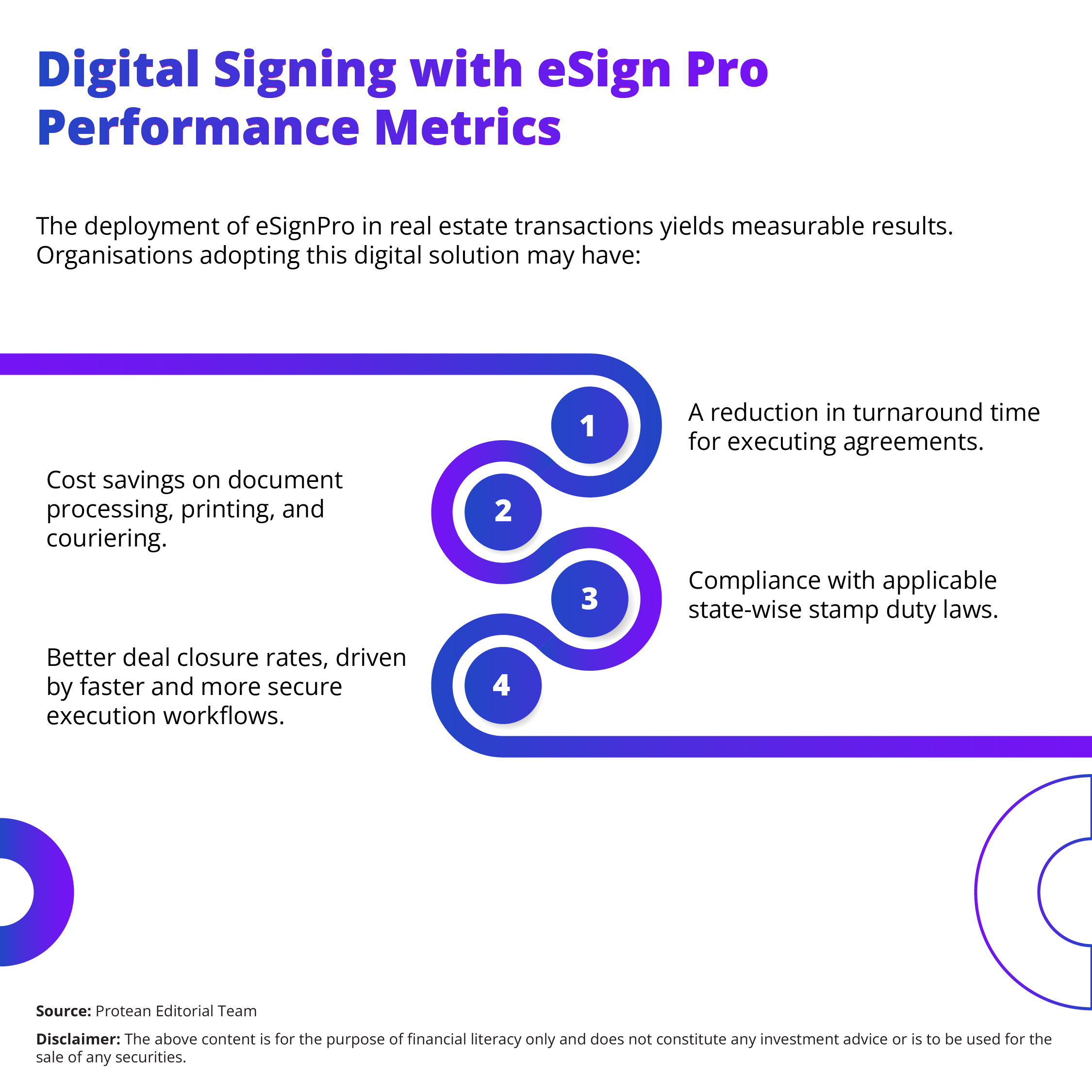What’s the role of eSign Pro in the real estate sector?
Before we answer this question about eSigning, let’s revisit the sector.
The Indian real estate sector stands as a major contributor to the nation’s economic growth, contributing approximately 7% to the GDP.
According to industry projections, the sector is poised to reach a market size of USD 1 trillion by 2030. However, despite this upward trajectory, the real estate industry continues to face significant operational hurdles, many of which stem from outdated, paper-based documentation and compliance workflows.
Thus, in an increasingly digital economy, the continued dependence on manual execution is no longer sustainable. Let us learn about how choosing to eSign Pro can help manage these challenges.
Navigating the Regulatory and Market Landscape
The Information Technology Act 2000 and Aadhaar eKYC regulations grant legal recognition to electronic signatures, including Aadhaar-based eSign. Moreover, the introduction of the Real Estate Regulation Act (RERA) reinforces the demand for transparency and efficiency in real estate transactions. At the same time, eStamping compliance varies widely across states, presenting a fragmented regulatory challenge.
Despite these favourable digital frameworks, many real estate businesses continue to face four major operational challenges:
- High turnaround time (TAT) due to manual document workflows.
- Non-uniform eStamping compliance across jurisdictions.
- Operational inefficiencies and elevated costs in document processing.
- Limited visibility into execution stages, often leading to disputes.
Major Challenges and Digital Sign Solutions
Let us look at some of the major challenges in the sector along with possible solutions.
1. Fragmented and Manual Documentation Process
At present, multiple stakeholders including developers, buyers, legal professionals and agents rely on manual procedures to draft, notarise, sign and stamp real estate agreements, which often involve physical interactions, courier services and handwritten signatures, making the overall process vulnerable to errors, inefficiencies and delays.
Protean eSignPro addresses these challenges with:
- Predefined and parameterised templates
- One-click execution workflows
2. Complex State-Specific eStamping and Compliance
India’s state-wise stamp duty regulations pose a significant hurdle in ensuring accurate document compliance. The process of identifying applicable rates, purchasing the right stamp papers, and submitting them for registration can be both time-consuming and risky.
With Protean eSignPro:
- Real-time integration with SHCIL (Stock Holding Corporation of India Limited) and state registration systems ensures jurisdiction-specific stamp duty is applied.
- Digital stamp compliance is automated, minimising the risk of legal disputes and processing delays.
3. Lack of Real-Time Agreement Visibility
Builders, legal teams, and channel partners often lack a centralised system to track the status of agreements. This results in frequent miscommunication, stalled approvals, and misplaced records, all of which can culminate in litigation or deal fallout.
eSignPro’s value proposition includes:
- One-view dashboards
- Tamper-proof audit logs
4. Inefficient Customer Communication
Traditional communication channels such as email, phone calls, and in-person meetings often delay approvals and reduce customer engagement in the document execution process. These outdated methods can significantly impact customer satisfaction and delay deal closure.
eSignPro enhances communication through:
- Seamless integration with WhatsApp, SMS, and Email, ensuring immediate and secure access to agreements.
- Automated reminders and alerts that speed up approval timelines and eliminate follow-up gaps.

Business Value and Strategic Advantage
Real estate developers, aggregators, and service providers stand to gain significant advantages by embracing digital workflows. Some of the major benefits include the following:
- Faster transactions: Agreements that previously required several days or weeks to complete can now be executed within minutes through the automated infrastructure of eSignPro.
- End-to-end compliance: Aligns with national regulations under the IT Act 2000, SHCIL guidelines, and RERA mandates, reducing legal risk.
- Operational cost efficiency: Eliminates expenses tied to printing, couriering, and in-person signing.
- Enhanced legal protection: With tamper-proof audit trails and verifiable timestamps, dispute resolution becomes faster and more defensible.
- Scalable across geographies: Facilitates cross-state transactions through jurisdiction-aware compliance logic integrated with digital stamping processes.
Conclusion
The Indian real estate sector is entering a new phase of digital maturity. With ambitious national targets, regulatory reforms, and customer expectations for speed and transparency, the transition from paper-based to digital execution is not just desirable, it is imperative. Solutions like Protean eSignPro empower developers, legal professionals, and customers to participate in real estate transactions with confidence, speed, and legal assurance.
eSignPro is well-positioned to reshape how agreements are executed across the real estate value chain. This results in a more agile, transparent and cost-effective real estate ecosystem that is well-aligned with the demands of the digital age. Request a demo now!

